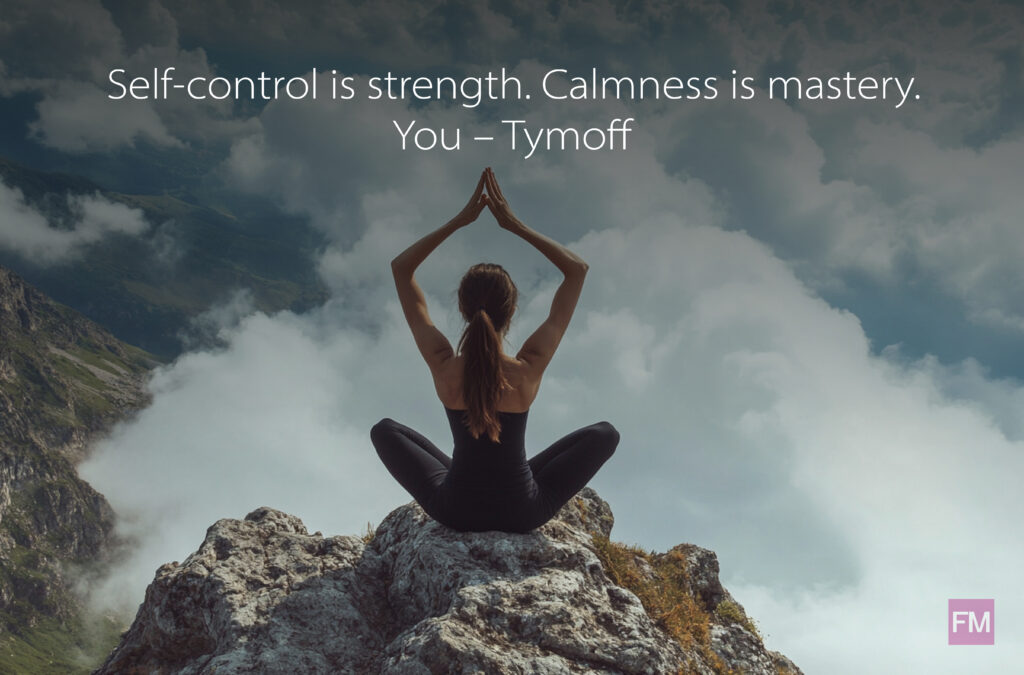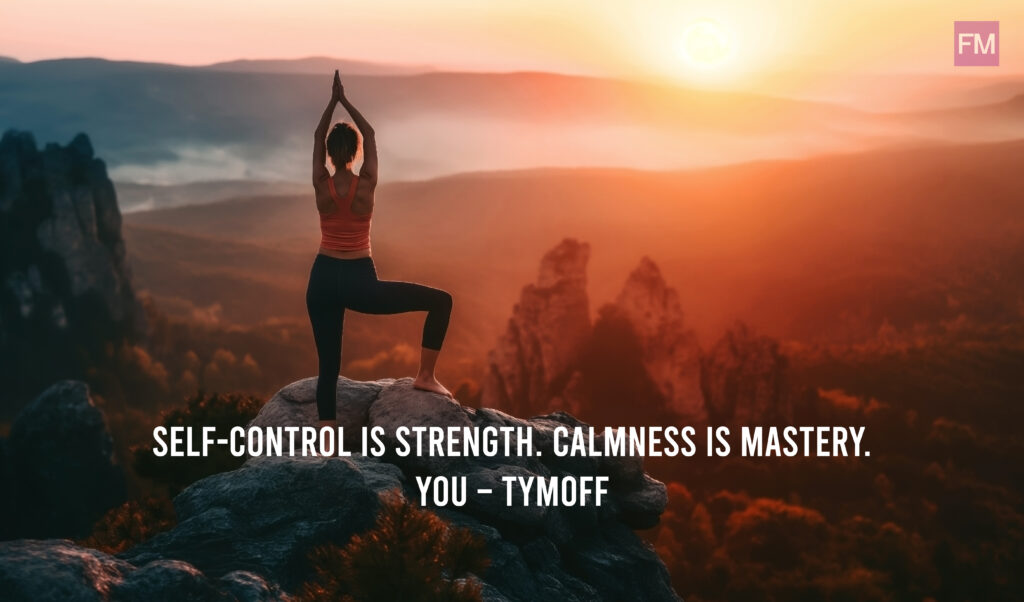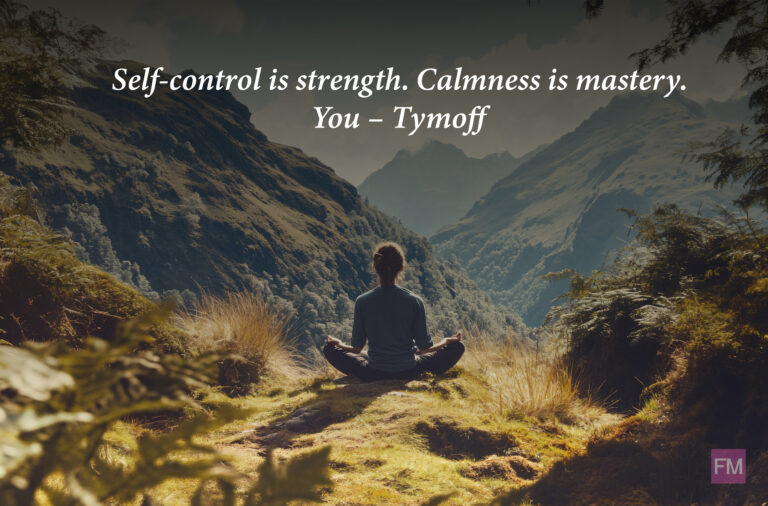The quote, “Self-control is strength. Calmness is mastery. You – Tymoff,” resonates as a guiding principle for personal growth and emotional well-being. It highlights the profound importance of cultivating discipline and composure to navigate life’s challenges with clarity and resilience. In a world filled with distractions and stress, self-control and calmness emerge as essential virtues that empower individuals to make better decisions, maintain focus, and nurture meaningful relationships. This article delves deep into the essence of these virtues, their interconnectedness, and how embracing this philosophy can transform lives.
Table of Contents
Understanding Self-Control: The Foundation of Inner Strength
Self-control is more than just willpower; it is a learned ability to govern one’s impulses and make choices aligned with long-term goals. It allows individuals to resist immediate gratification in favor of more meaningful outcomes. For example, self-control helps someone avoid unhealthy habits or procrastination, paving the way for success in personal and professional life. Studies show that individuals with higher levels of self-control are better at managing stress and achieving their objectives. This inner strength forms the backbone of a disciplined life, enabling people to thrive despite challenges and setbacks.
The Power of Calmness: Achieving Mastery Over Emotions
Calmness is the ability to maintain a steady mind and composed demeanor, even in high-pressure situations. It is a form of mastery that stems from emotional intelligence and mindfulness. Calmness not only enhances decision-making but also improves one’s ability to communicate effectively and solve problems. For instance, staying calm during an argument can prevent escalation and lead to constructive solutions. Research has linked calmness to better physical and mental health, reduced anxiety, and improved focus. Cultivating calmness involves techniques such as deep breathing, meditation, and reframing negative thoughts into positive perspectives.

The Interconnection Between Self-Control and Calmness
Self-control and calmness are deeply interconnected, as one often strengthens the other. Self-control provides the discipline needed to respond to stressful situations with calmness rather than reacting impulsively. Likewise, calmness reinforces self-control by helping individuals maintain focus and clarity in the face of challenges. Together, these qualities create a virtuous cycle that supports personal growth, emotional stability, and resilience. For example, a student preparing for exams might use self-control to adhere to a study schedule and calmness to stay composed during the test, ensuring both preparation and performance are at their peak.
Practical Steps to Develop Self-Control and Calmness
Developing self-control and calmness requires consistent effort and mindfulness. To enhance self-control, start by setting clear goals, creating structured routines, and practicing delayed gratification. For instance, breaking larger tasks into smaller, manageable steps can make goals feel achievable and less overwhelming. To foster calmness, incorporate practices like deep breathing, mindfulness meditation, and journaling into daily life. Even something as simple as taking a five-minute pause before reacting to a stressful event can make a significant difference. Over time, these habits build mental resilience and a calmer, more focused mindset.
The Role of Self-Control and Calmness in Personal Relationships
Healthy relationships thrive on understanding, patience, and effective communication—qualities rooted in self-control and calmness. Self-control helps individuals avoid reacting in anger or frustration, while calmness allows them to approach conflicts with empathy and clarity. For instance, a calm response during a disagreement can de-escalate tension and lead to constructive dialogue. Relationships where both partners practice these virtues often experience deeper trust and mutual respect. By managing one’s emotions and responses, it becomes easier to foster connections that are supportive, loving, and enduring.

Embracing the Philosophy: “Self-Control is Strength. Calmness is Mastery. You – Tymoff”
This philosophy serves as a timeless reminder to focus inward and harness personal power through discipline and composure. It encourages individuals to see self-control as a form of strength that shapes their actions and decisions, and calmness as a mastery that enhances their interactions and mental well-being. Embracing this mindset involves consistent practice, self-reflection, and a commitment to personal growth. By living according to these principles, individuals can lead more fulfilling lives, marked by purpose and resilience.
Conclusion
Self-control and calmness are transformative qualities that empower individuals to navigate life with confidence and clarity. By mastering self-discipline and composure, one can overcome challenges, build stronger relationships, and achieve meaningful success. The quote “Self-control is strength. Calmness is mastery. You – Tymoff” serves as a beacon of inspiration, reminding us to prioritize personal growth and inner peace. Cultivating these virtues is not an overnight process but a lifelong journey that brings profound rewards.
FAQs
Q: Why is self-control considered a strength?
A: Self-control enables individuals to regulate their actions and resist immediate temptations, helping them achieve long-term goals and maintain focus.
Q: How does calmness improve decision-making?
A: Calmness allows for clear thinking and reduces the influence of stress or emotions, leading to better, more rational decisions.
Q: Can self-control and calmness be learned?
A: Yes, both qualities can be developed through consistent practice, mindfulness, and techniques like meditation and goal setting.
Q: How do these qualities affect relationships?
A: They foster patience, empathy, and effective communication, leading to healthier and more supportive connections.
Q: What is the main takeaway from the philosophy of Tymoff?
A: The philosophy emphasizes the importance of self-discipline and emotional mastery in creating a fulfilling and resilient life.
READ MORE : Ballysports.com Activate: How to Easily Activate Bally Sports on Your Device


